Related Research Articles
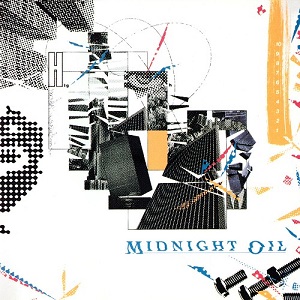
10, 9, 8, 7, 6, 5, 4, 3, 2, 1 is the fourth studio album by Midnight Oil that was released on vinyl in 1982 under the Columbia Records label. It peaked at No. 3 on the Australian Kent Music Report Albums Chart and remained on the chart for 171 weeks.
Craig Mathieson is an Australian music journalist and writer. His books include, Hi Fi Days (1996), The Sell-In in (2000) and the 100 Best Australian Albums in 2010, with Toby Creswell and John O'Donnell
Stephen Donald Cummings is an Australian rock singer-songwriter and writer. He was the lead singer of Melbourne-based rock band the Sports from 1976 to 1981, followed by a solo career which has met with critical acclaim but has had limited commercial success. He has written two novels, Wonderboy (1996) and Stay Away from Lightning Girl (1999), and a memoir, Will It Be Funny Tomorrow, Billy (2009). In 2014 a documentary film, Don't Throw Stones, based on his memoir premiered as part of the Melbourne International Film Festival.

1001 Songs: The Great Songs of All Time and the Artists, Stories and Secrets Behind Them is a compendium of notable popular recordings collected by Australian rock journalist and critic Toby Creswell. The book was initially published in 2005 by Hardie Grant Books and subsequently published in the United States by Thunder's Mouth Press in 2006. It is not a collection of songs, but of the stories behind what Creswell considers are the great songs of all time – from George Gershwin to Missy Elliott, from Bob Dylan to Alicia Keys, from Frank Sinatra to The Offspring, from Leonard Cohen to Pulp. The book also features over 400 photographs and album covers.
John O'Donnell is a long-standing member of the Australian music industry. Starting as a freelance writer, he eventually became the music editor of Rolling Stone Australia before leaving to co-found and edit Juice Magazine.

"Quasimodo's Dream" is a song by Australian pop/new wave band The Reels and was released as the title single off their second album, Quasimodo's Dream in May 1981. The album peaked at No. 27 on the Australian Kent Music Report Albums Chart but the single did not reach the Top 50 of the related Singles Chart. Rock music historian, Ian McFarlane claimed, "the album's highlight was the sparse, evocative title track". The song, written by lead singer Dave Mason, is now regarded as a classic—in 2001 it was named by Australasian Performing Right Association (APRA) at No. 10 of their Top 30 Australian songs of all time. It was covered by fellow Australians Kate Ceberano (1989) and Jimmy Little (1999).

Sadie is the debut studio album by Australian pop singer John Farnham it was released by EMI Records in April 1968. The lead single, "Sadie " had been released in November 1967, it was No. 1 on the Go-Set National Singles Charts for five weeks, and was the largest selling single in Australia by an Australian artist in the 1960s. The single, "Sadie " sold approximately 180,000 copies in Australia, and was also released in New Zealand, Denmark and Germany. The second follow up album single was Jeff Barry/Ellie Greenwichs "Friday Kind of Monday" included on the album and was released in March as a double-A side with a cover of Flanagan and Allens, "Underneath the Arches" as Farnham's second single, which peaked at No. 6.
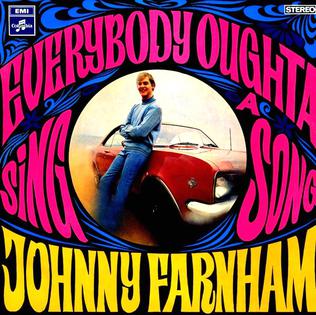
Everybody Oughta Sing A Song is the second solo studio album by Australian pop singer John Farnham and was released on EMI Records in November 1968. Its first single, released in July, was the double A-sided, "Jamie"/"I Don't Want To Love You", which peaked at No. 8 on the Go-Set National Singles Charts. The second single, "Rose Coloured Glasses" was released in October and peaked at No. 16. Writers on the album included Hans Poulson, Neil Diamond and Quincy Jones. The album was re-released in 1974 with a different cover, it shows Farnham performing live on stage, whereas the initial 1968 release had him leaning against a Holden Monaro.

Johnny is the fifth studio album by Australian pop singer John Farnham, which was released on HMV for EMI Records in August 1971. It peaked at No. 24 on the Australian Kent Music Report Albums Charts. Farnham had earlier No. 1 singles with "Sadie " in 1968 and his cover of "Raindrops Keep Fallin' on My Head" in 1970; a non-album single, "Acapulco Sun" was released in May 1971 but there were no charting singles from Johnny. The album features compositions from artists as diverse as George Harrison, Elton John, Stevie Wonder, Joe South and George Gershwin and Ira Gershwin
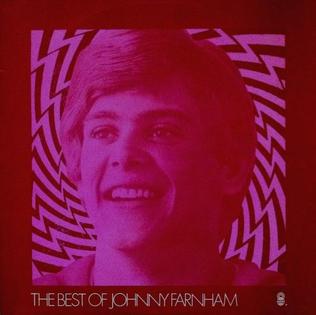
The Best Of Johnny Farnham is the first compilation album by Australian singer Johnny Farnham, it was released on World Record Club in 1971. "Sadie " was first released in November 1967 and peaked at No. 1 on the Go-Set National Singles Charts for five weeks early in 1968. His cover of the B. J. Thomas hit "Raindrops Keep Fallin' on My Head" had been released in November 1969 and peaked at No. 1 for seven weeks in January–March 1970. The album cover was available in a variety of colours including orange, red and blue.
Toward the Blues is a studio album by Australian blues band Chain. The album reached No. 6 on the Kent Music Report Albums Chart. In October 2010, it was listed in the book, 100 Best Australian Albums.
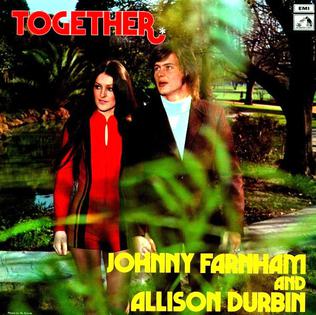
Together is a studio album of duets by Australian pop singers John Farnham and Allison Durbin, which was released on HMV for EMI Records in September 1971. It peaked at No. 20 on the Australian Go-Set's Albums Chart.
Martin Fabinyi is an Australian film and television producer and director, songwriter and screenwriter and has written books on the local rock music scene. He was the chief executive officer of Mushroom Pictures from its formation in 1995 to 2009. His film projects include the features Chopper (2000), Gettin' Square (2003) and Macbeth (2006). In 2001, Fabinyi was named one of the top ten international producers to watch by Variety and one of the most influential people in the Australian film industry by Screen International magazine.

The 100 Best Australian Albums is a compendium of rock and pop albums of the past 50 years as compiled by music journalists Toby Creswell, Craig Mathieson and John O'Donnell. The book was published on 25 October 2010 by Hardie Grant Books. Sony Music has released a five CD compilation to support the book.
"Leaps and Bounds" / "Bradman" is a double A-sided single by Australian rock group Paul Kelly and the Coloured Girls released in January 1987. "Leaps and Bounds" is from their debut double album, Gossip (1986). "Bradman" did not appear on a studio album until the international version of Under the Sun (1988). The single reached top 100 in the Australian Kent Music Report Singles Chart. Due to possible racist connotations the band changed its name, for international releases, to Paul Kelly and the Messengers. In 1997, Kelly was inducted into the ARIA Hall of Fame, at the ceremony Crowded House paid tribute to Kelly and performed "Leaps and Bounds". In October 2003, Xanthe Littlemore covered "Leaps and Bounds" for the tribute album, Stories of Me – A Songwriter's Tribute to Paul Kelly. In 2005, rock music writer, Toby Creswell described two of Kelly's songs: "Leaps and Bounds" and "From Little Things Big Things Grow" in his book, 1001 Songs. For the former, Creswell observed "The grand themes of [his] work are all there – Melbourne, football, transcendence and memory... [he] is a detail man – the temperature, the location, foliage". On 26 March 2006 Kelly performed at the Commonwealth Games closing ceremony in Melbourne, singing "Leaps and Bounds" and "Rally Around the Drum". In February 2009 Patience Hodgson, Glenn Richards and Kelly performed "Leaps and Bounds" at the Myer Music Bowl for SBS-TV's concert RocKwiz Salutes the Bowl. On 29 September 2012 Kelly performed "How to Make Gravy" and "Leaps and Bounds" at the 2012 AFL Grand Final although most of the performance was not broadcast on Seven Network's pre-game segment.
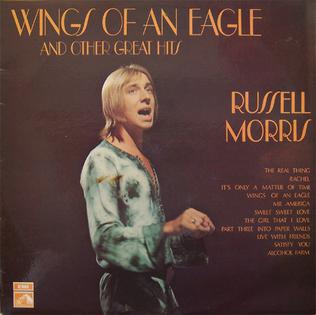
"Wings of an Eagle and Other Great Hits" is the first greatest hits compilation by Australian singer songwriter Russell Morris. The album peaked at number 12 on the Go-Set chart in March 1973.
"Undecided" is the debut single by Australian rock group, the Masters Apprentices, which was issued in October 1966 on Astor Records. It peaked at No. 13 on the Go-Set national singles charts.
"Buried and Dead" is the second single by Australian rock group, the Masters Apprentices, which was issued in May 1967 on Astor Records. It peaked at No. 26 on the Go-Set national singles charts.
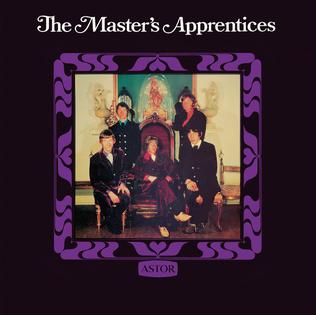
The Masters Apprentices is the self titled debut studio album by the Masters Apprentices, released in June 1967 on Astor Records. It featured two hit singles; "Undecided" and "Buried and Dead".

Goodbye Tiger is the fourth studio album by Australian rock music singer-songwriter, Richard Clapton. It was released in August 1977 via Infinity Records/Festival Records and was produced by Richard Batchens. It peaked at No. 11 on the Kent Music Report Albums Chart. In October 2010 it was listed at No. 15 in the book, 100 Best Australian Albums.
References
- ↑ Cauchi, Stephen (4 November 2007). "Right, said Led: old fogeys of rock in classic reunion mode". The Age . Fairfax Media . Retrieved 24 April 2008.
- ↑ Carney, Shaun (5 November 2005). "Shuffling through a century of song". The Age. Fairfax Media. Retrieved 24 April 2008.
- ↑ Creswell, Toby; Martin Fabinyi (1986). Too Much Ain't Enough. Milsons Point, NSW: Random House. ISBN 0-09-182818-X.
- 1 2 3 Creswell, Toby (1999). The Real Thing: Adventures in Australian Rock & Roll, 1957-now. Milsons Point, NSW: Random House. ISBN 978-0-09-183547-7.
- ↑ Creswell, Toby; Samantha Trenoweth (2006). 1001 Australians you should know. North Melbourme, Victoria: Pluto Press Australia. ISBN 978-1-86403-361-8.
- 1 2 3 4 5 "Toby Creswell". Rock's Backpages. Backpages Limited. Retrieved 19 March 2009.
- 1 2 3 4 Boots, Tim (23 April 2007). "Rolling Stone still rocking 35 years on". The Sydney Morning Herald . Fairfax Media. Retrieved 19 March 2009.
- ↑ "FFC triggers $57.5 million of Australian production". Screen Australia. July 2006. Retrieved 19 March 2009.
- ↑ "Great Australian Albums". Internet Movie Database (IMDb). Retrieved 19 March 2009.
- ↑ "MIPCOM Press Release". Special Broadcasting Service (SBS). 8 October 2008. Archived from the original (PDF) on 26 August 2012. Retrieved 19 March 2009.
- ↑ Kermond, Clare (14 October 2004). "For the record". The Age . Retrieved 24 April 2008.
- ↑ Creswell, Toby (2007) [2005]. 1001 Songs: The Great Songs of All Time and the Artists, Stories and Secrets Behind Them ( RocKwiz ed.). Prahran, Vic: Hardie Grant. ISBN 978-1-74066-458-5.
- ↑ "Paul Kelly the Movie".
- ↑ "Too Much Ain't Enough". National Library of Australia. Retrieved 19 March 2009.
- 1 2 3 4 "Creswell, Toby". National Library of Australia. Retrieved 19 March 2009.
- ↑ "Notorious Australians". National Library of Australia. Retrieved 19 March 2009.
- ↑ "100 Best Australian Albums". National Library of Australia. Retrieved 2 November 2010.